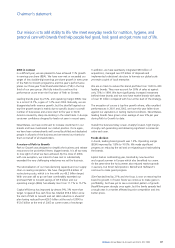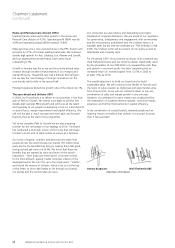Unilever 2003 Annual Report Download - page 20
Download and view the complete annual report
Please find page 20 of the 2003 Unilever annual report below. You can navigate through the pages in the report by either clicking on the pages listed below, or by using the keyword search tool below to find specific information within the annual report.Unilever Annual Report & Accounts and Form 20-F 2003 17
Financial review
The Group’s effective tax rate on profit was 33.6% for the year
(2002: 39.6%) and reflects the non-tax-deductibility of Bestfoods
goodwill amortisation. The underlying tax rate for the year, before
exceptional items and amortisation, was 29% compared with
30% last year, with sustained benefits flowing from the Path to
Growth programme.
Minority interests decreased by 20% to €249 million (2002:
€312 million). This decrease is due to the one-off change in
fiscal policy, which positively affected local shareholders in India
in 2002.
Net profit rose by 29% to €2 762 million with lower exceptional
charges and the improvements in operating margin, interest and
tax more than offsetting the negative impact of exchange rates.
Combined earnings per share increased by 32% and combined
earnings per share BEIA increased by 2%.
Return on invested capital for the year was 12.5%, up from 9.8%
in 2002. The progress was the result of improved operating
margins arising from Bestfoods synergy benefits and additional
procurement and restructuring savings. Our capital base was also
reduced by further rationalisation and disposal of capital intensive
production facilities.
The definition and further details on return on invested capital are
given on pages 126 and 128.
Results – 2002 compared with 2001
As noted in the preceding section, with effect from 1 January
2003 we have adopted UK FRS 17 in respect of pensions
accounting and have implemented a new accounting policy for
share options. Amounts for prior years have been restated in the
financial statements and in the following commentary.
The 7% strengthening of the average exchange rate for the euro
against the basket of Unilever currencies impacted turnover,
which fell by 7% to €48 760 million. Underlying sales growth of
4% at constant rates was offset by the net impact of acquisitions
and disposals, which reduced turnover by 4%. The most
significant disposal impact came from DiverseyLever and Mazola,
offset by the increase in our holding in the Unilever Bestfoods
Robertsons business in Africa and the Middle East.
Group turnover, excluding our share of the turnover of joint
ventures, fell by 6% to €48 270 million. Our share of turnover
from joint ventures fell to €490 million (2001: €692 million) as
the increase in our holding in Unilever Bestfoods Robertsons
resulted in its reclassification as a subsidiary.
Operating profit was €5 091 million (2001: €5 030 million) and
the operating margin was 10.4% compared to 9.6% in 2001.
Operating profit BEIA was €7 054 million (2001: €7 032 million).
Operating margin BEIA improved to 14.5% from 13.5% in 2001.
This underlying margin improvement reflects the continuing
contribution from our Path to Growth strategy; it was offset by
the strengthening of the euro, leaving operating profit BEIA in
line with 2001. Group operating profit BEIA was also flat at
€6 959 million.
Amortisation of goodwill and intangible assets was €1 261 million
for the year, down from €1 423 million in 2001. The decrease was
primarily due to the strengthening of the euro during the year.
Included in the charge is €1 023 million in respect of Bestfoods.
Exceptional items included in operating profit for the year of
€702 million included €1 163 million of restructuring costs, a
credit of €363 million for the net profits and losses on business
disposals and €98 million credit from the release of legal and
environmental provisions following the settlement of certain legal
claims in our favour. Associated costs included within operating
profit BEIA were €191 million for the year (2001: €373 million).
The exceptional costs incurred during the year primarily relate
to the Path to Growth initiatives announced in February 2000,
and to the integration of Bestfoods.
Group operating profit rose by 1% to €5 007 million, with the
underlying margin improvement offset by higher exceptional
charges and the 6% average currency impact.
Net interest cost for the year, excluding pensions interest, was
€473 million lower at €1 173 million as we benefited from strong
cash flow from operations, the proceeds of business disposals,
lower interest rates and the favourable effect of currency
movements. Net interest cover for the year was 4.5 times, up
from 3.1 times in 2001. The net interest cover on the basis of
EBITDA was 7.0 times (2001: 4.9 times). The net interest credit
on pensions was €108 million (2001: €42 million).
The Group’s effective tax rate on profit for the year was 39.6%
(2001: 44.2%). This rate reflects the non-deductibility of the
Bestfoods goodwill amortisation and a lower effective tax rate
on net exceptional items. The underlying tax rate before
exceptional items and amortisation for the year was 30%
(2001: 33%).
Minority interests increased to €312 million (2001: €239 million),
mainly as a result of a fiscal policy change affecting local
shareholders in India.
Net profit for the year rose by 27% to €2 136 million; combined
earnings per share were up 29%; combined earnings per share
BEIA increased by 17%.
Return on invested capital increased to 9.8% from 8.7% in 2001.
Acquisitions and disposals
Acquisitions
On 18 February 2003, we announced an agreement to acquire
the remaining unheld shares in CPC/Aji Asia, a joint venture with
operations in six countries, from Ajinomoto Co. Inc., Japan.
Unilever will pay a total of US $381 million (€338 million) for
Ajinomoto’s equity holding. Unilever had full management control
of the business with effect from 25 March 2003.
On 14 October 2003, we announced the creation of Pepsi Lipton
International, a 50:50 joint venture between Unilever and Pepsico,
to market and distribute ready-to-drink tea in several international
markets outside North America.
In 2002, we increased our holding in the Robertsons business in
South Africa and Israel to 59%, and took a one-third equity share
in JohnsonDiversey Holdings Inc.
























